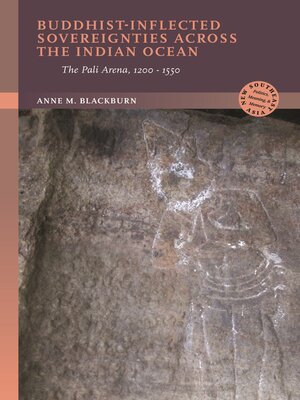Buddhist-Inflected Sovereignties across the Indian Ocean
ebook ∣ The Pali Arena, 1200–1550 · New Southeast Asia: Politics, Meaning, and Memory
By Anne M. Blackburn

Sign up to save your library
With an OverDrive account, you can save your favorite libraries for at-a-glance information about availability. Find out more about OverDrive accounts.
Find this title in Libby, the library reading app by OverDrive.



Search for a digital library with this title
Title found at these libraries:
| Loading... |
Buddhist-Inflected Sovereignties across the Indian Ocean draws attention to the varied, historically contingent, and sometimes competing, arguments for and about sovereignty that operated in the Pali arena during the first half of the second millennium AD. It was a time of expanding interaction within the Indian Ocean just prior to Portuguese colonial presence in Southern Asia. Developing a linked series of case studies and examining territories now subsumed within the nation-states of Sri Lanka, Burma/Myanmar, and Thailand, Blackburn examines sovereign arguments expressed textually, as well as in the built environment, by persons with an interest in the teachings and institutions associated with Gotama Buddha. These cases show that no single model of Buddhist-inflected sovereignty dominated the Pali arena during this time, and that there was no stable vision of "Buddhist kingship." Rather, over time, there was an accrual of possible models and pathways for argumentation about how sovereigns could and should relate to buddha-sāsana. Taking inspiration from diverse sources transmitted through multiple forms and media, arguments for and about sovereignty in the Pali arena were contested and rapidly changing. As the Indian Ocean increasingly shaped the flow of people, objects, and ideas, more peoples and territories participated in the Pali arena, attracted by its intellectual and aesthetic resources.
Drawing on extensive scholarship and a wide range of multilingual source materials from premodern Sri Lanka, Burma, Thailand, and Cambodia, Anne M. Blackburn develops innovative conclusions about the relationships between textuality, sovereignty, maritime connectivity, and material culture in each of these areas. The book contributes simultaneously to several fields of study: the intellectual history of Southern Asia, literary and historical scholarship on Buddhism, and historical studies of the Indian Ocean. By offering accessible yet in-depth analysis, Buddhist-Inflected Sovereignties across the Indian Ocean connects research fields and introduces new interpretive possibilities for the study of sovereignty, politics, premodern textual cultures, and Buddhism.






